Database Assistant Resume Examples

Jul 18, 2024
|
12 min read
Get the job: Craft a database assistant resume that computes success. Discover tips for your skills, experience, and formatting. Master this guide to show you are a data-whiz and stand out to employers.
Rated by 348 people
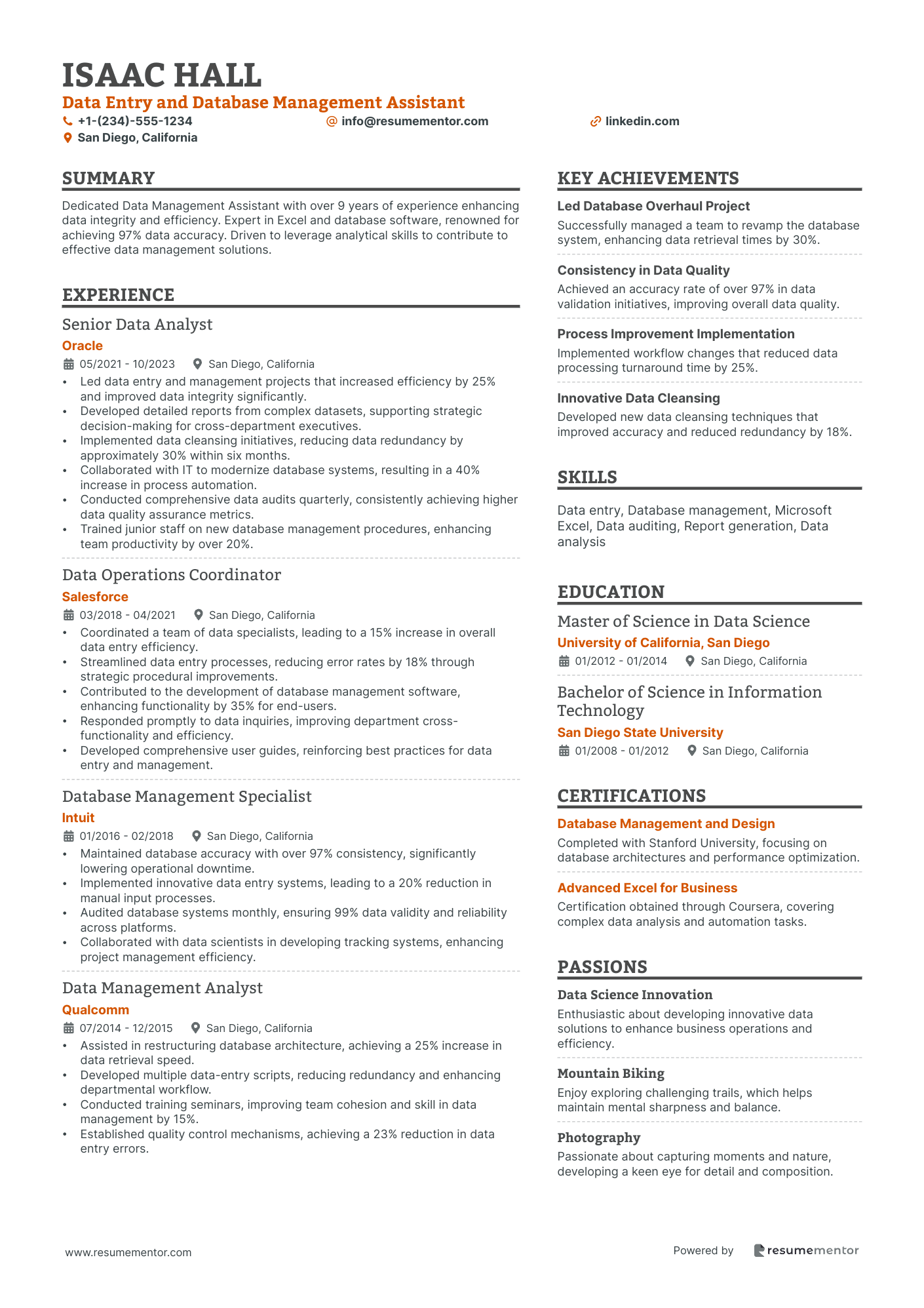
Data Entry and Database Management Assistant
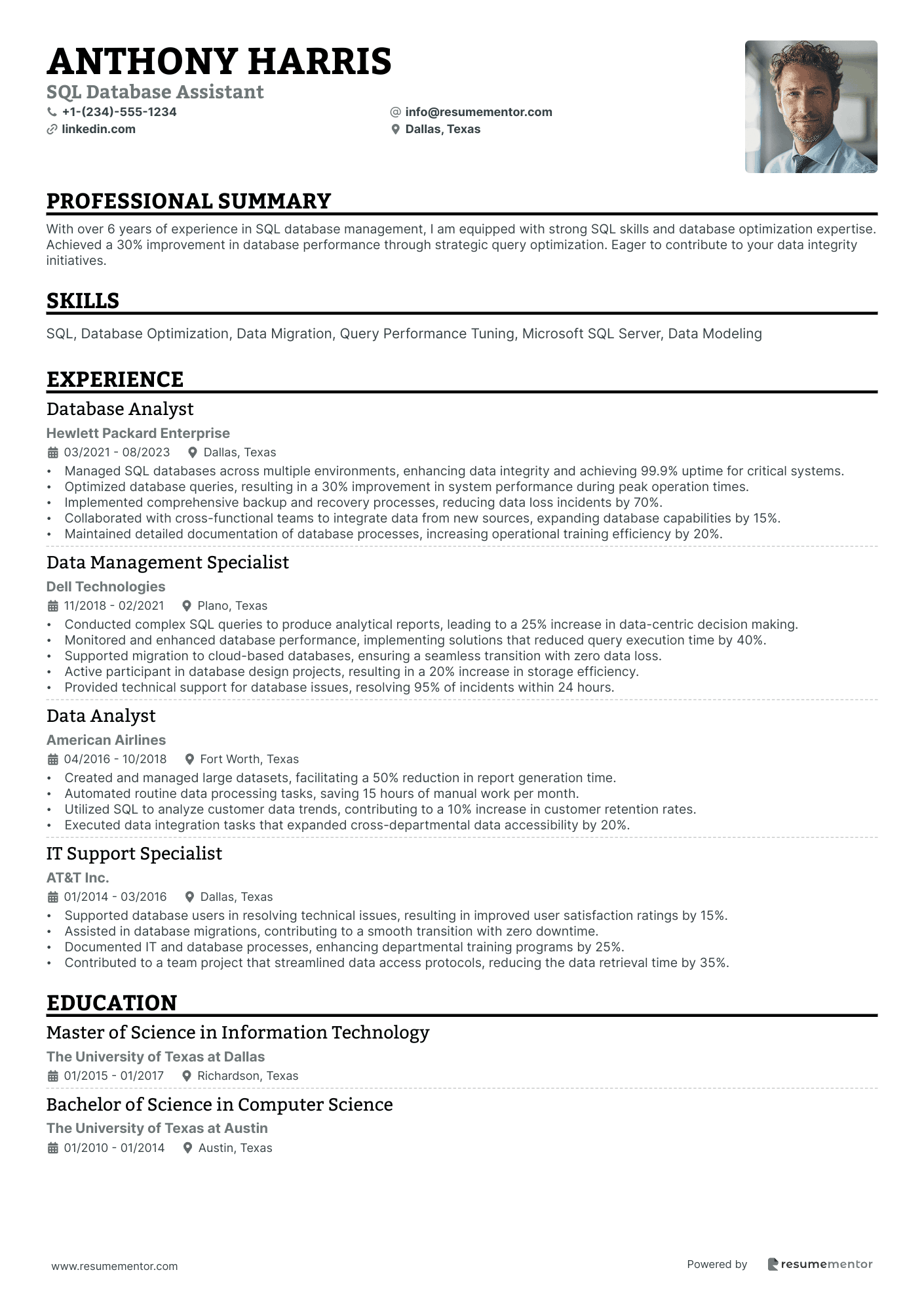
SQL Database Assistant
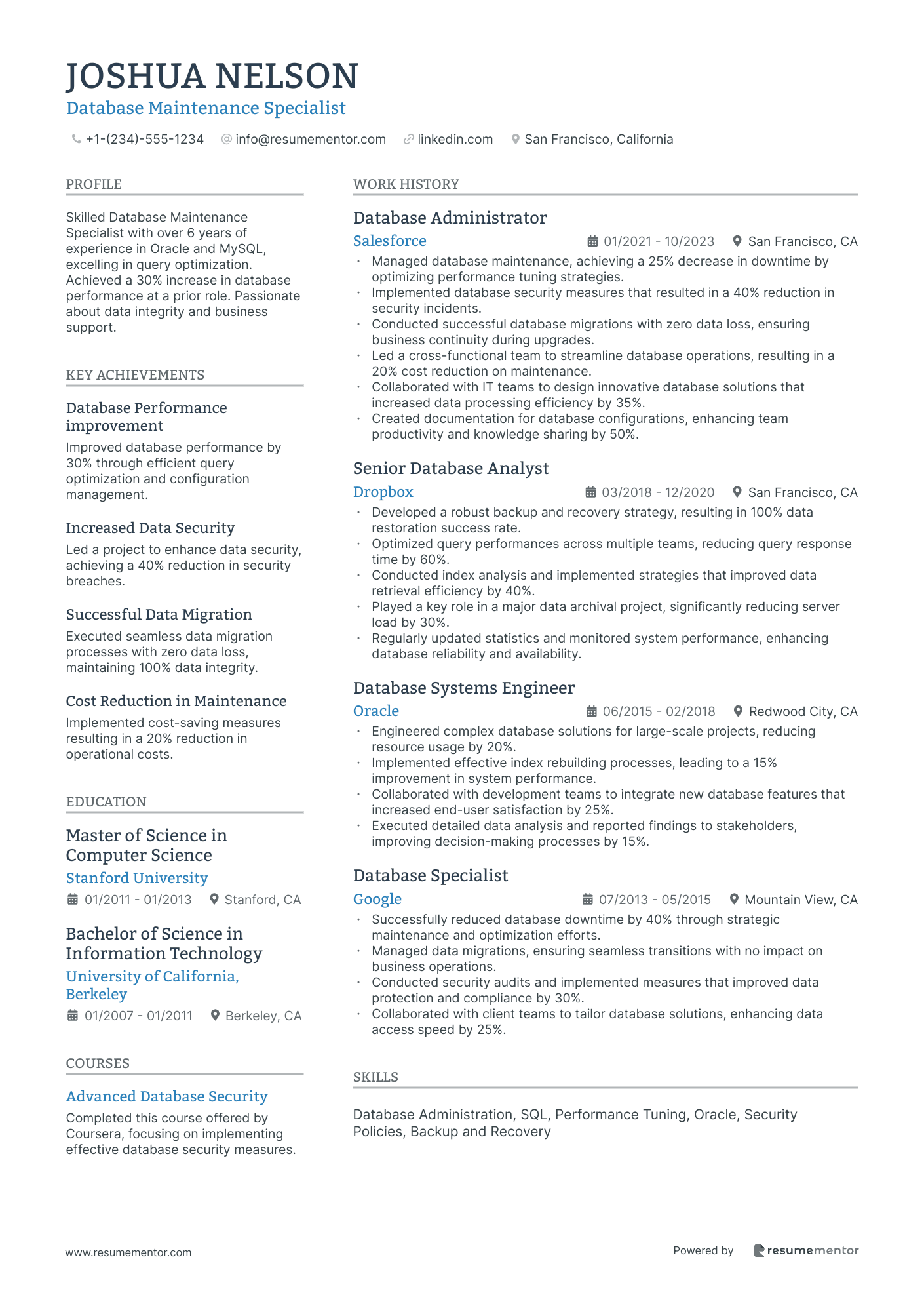
Database Maintenance Specialist
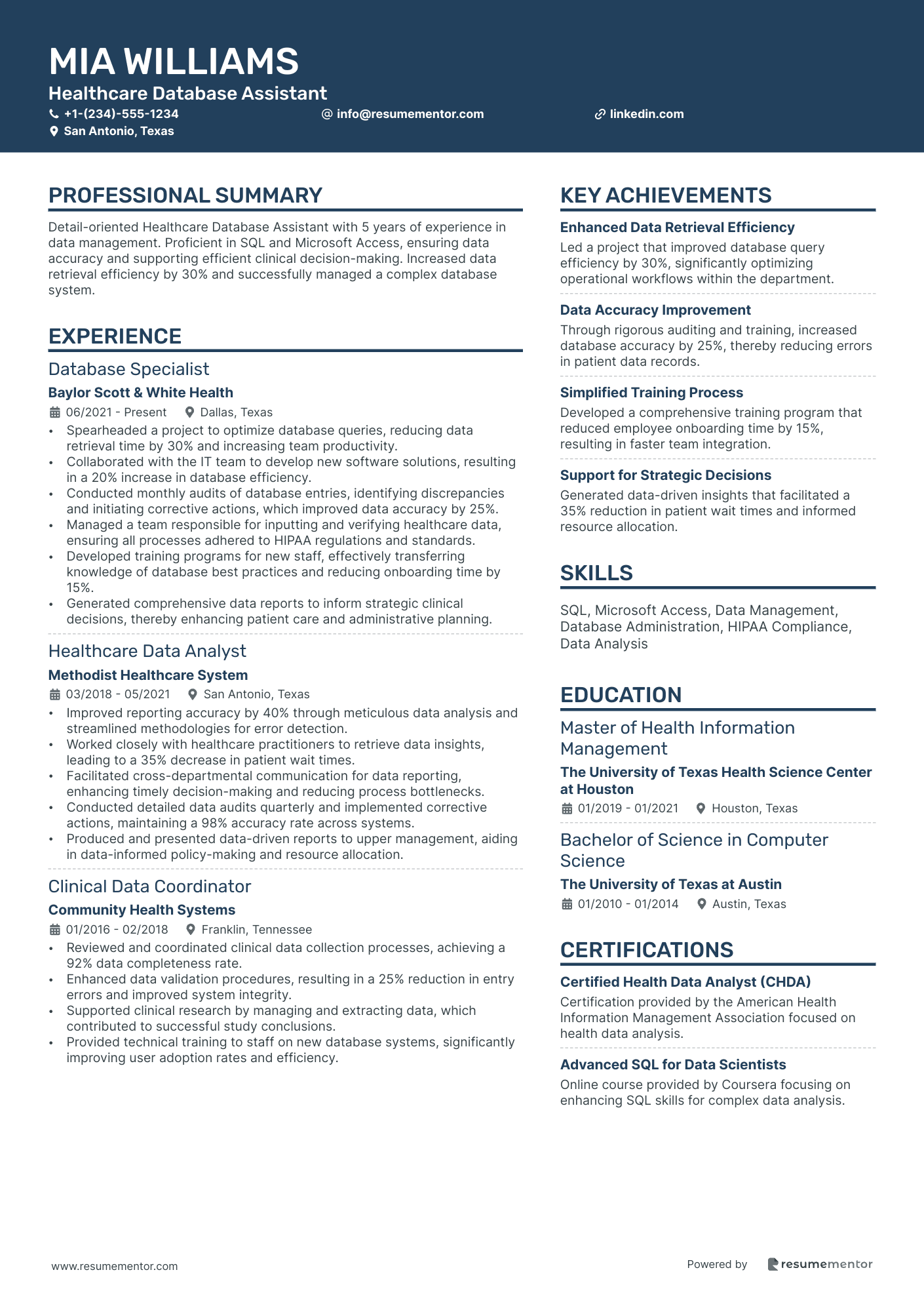
Healthcare Database Assistant
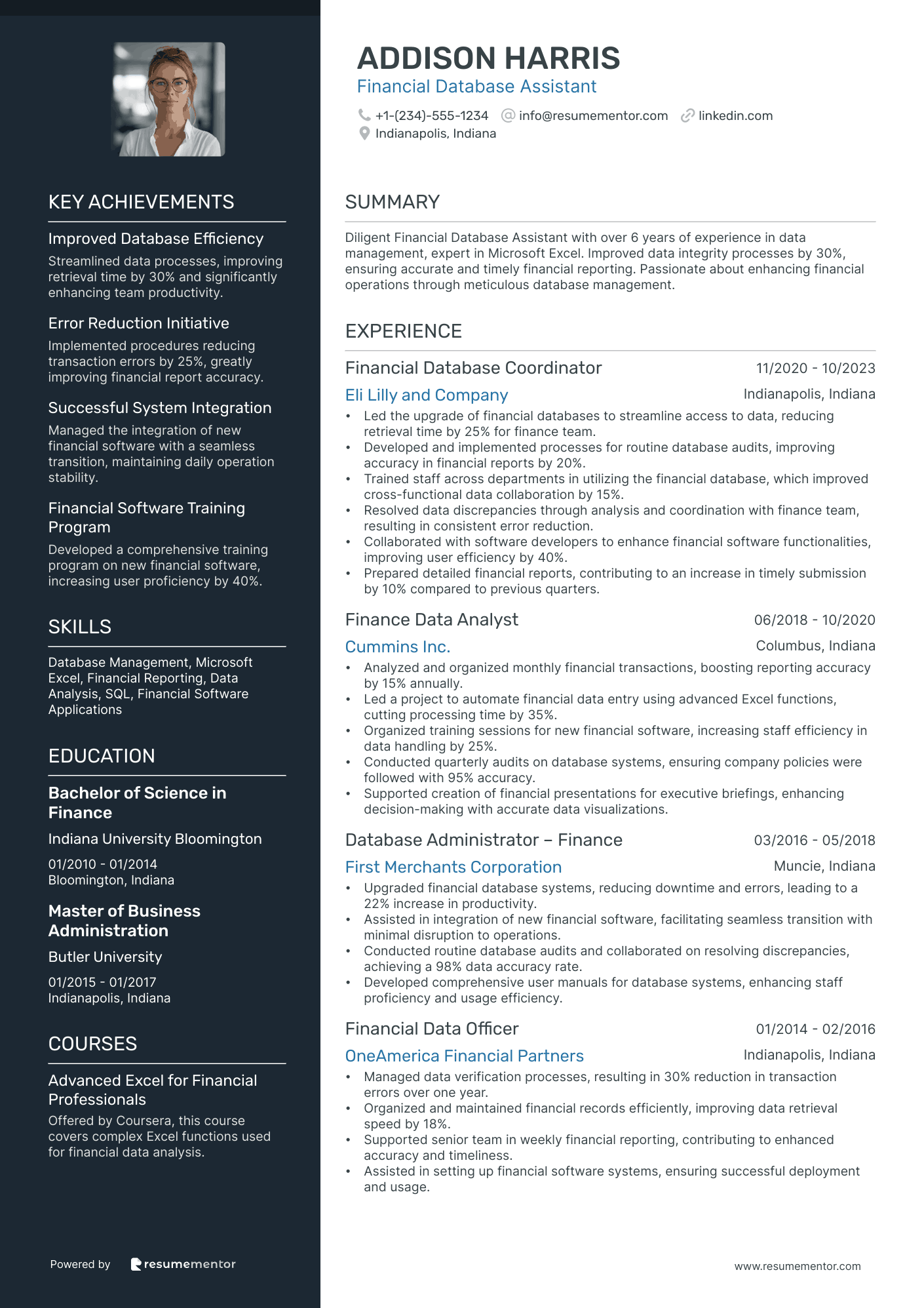
Financial Database Assistant
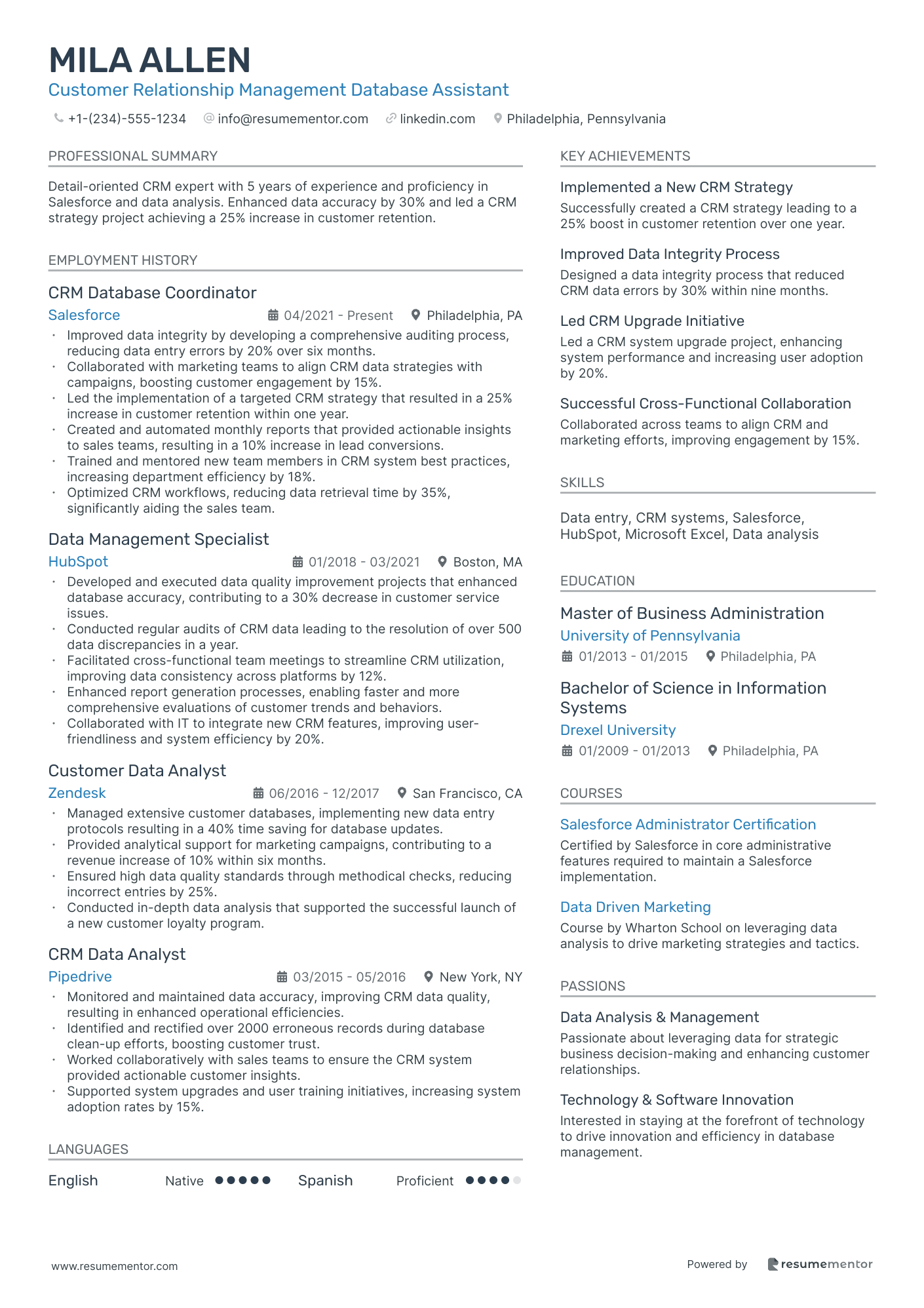
Customer Relationship Management Database Assistant
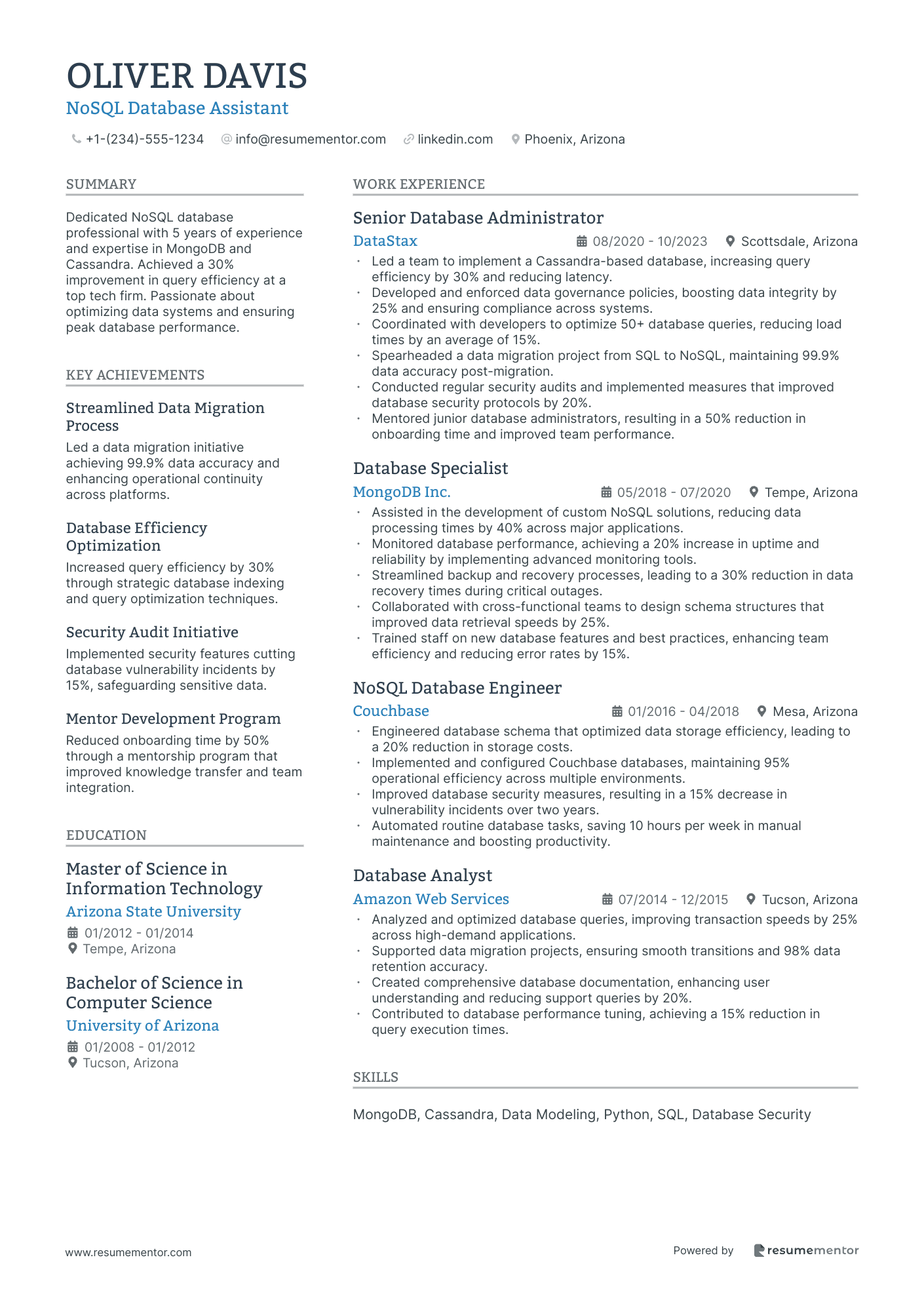
NoSQL Database Assistant
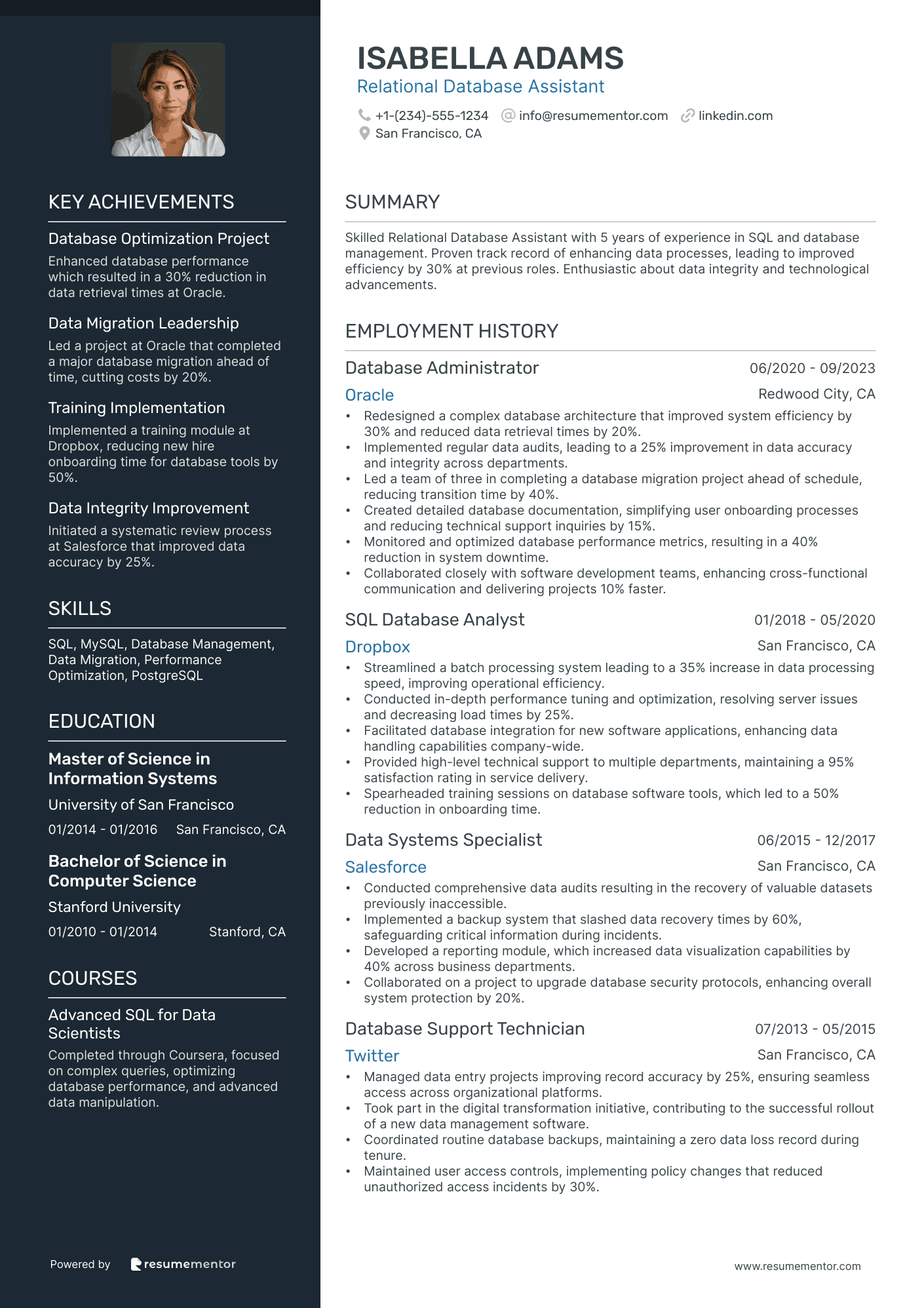
Relational Database Assistant
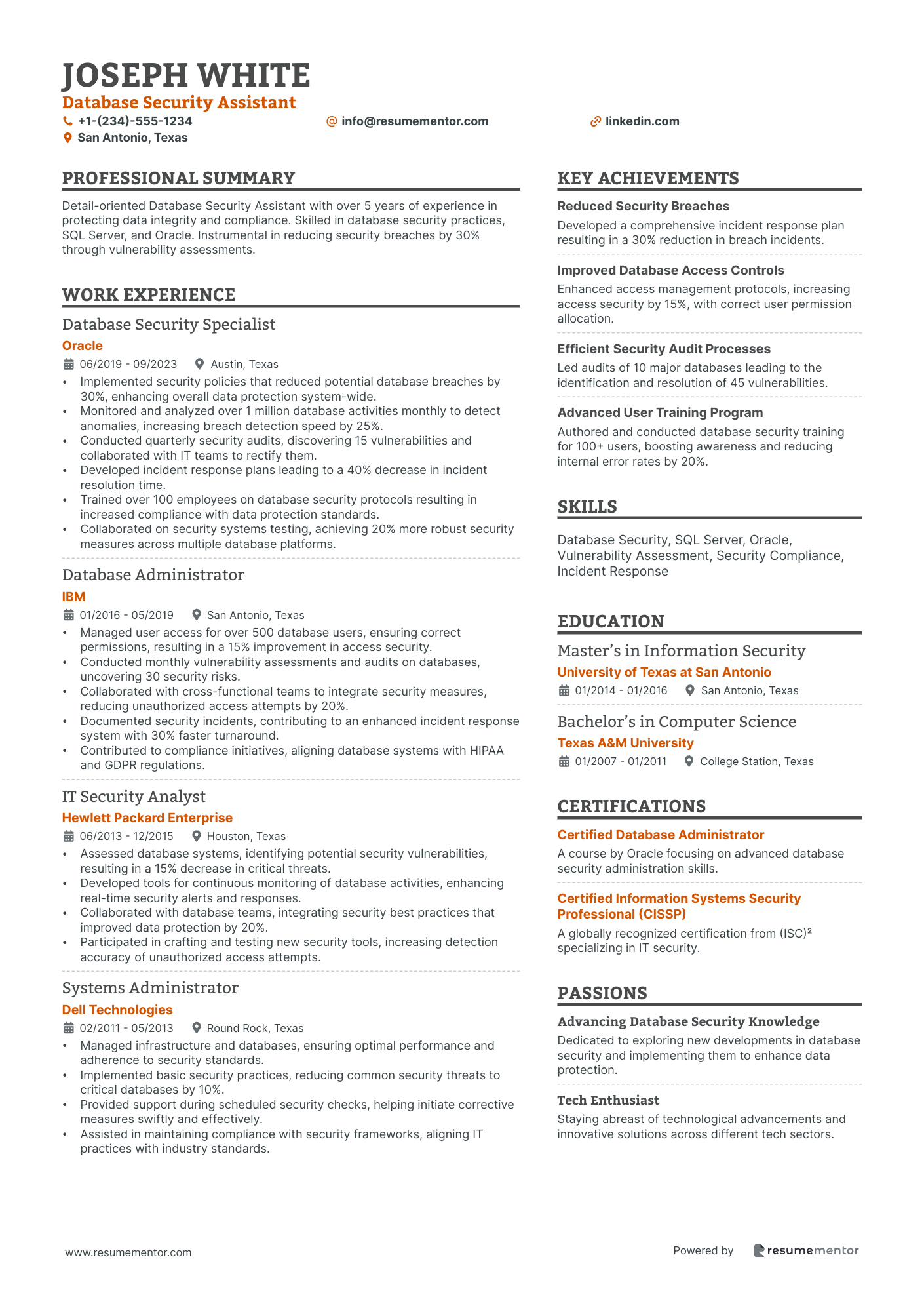
Database Security Assistant
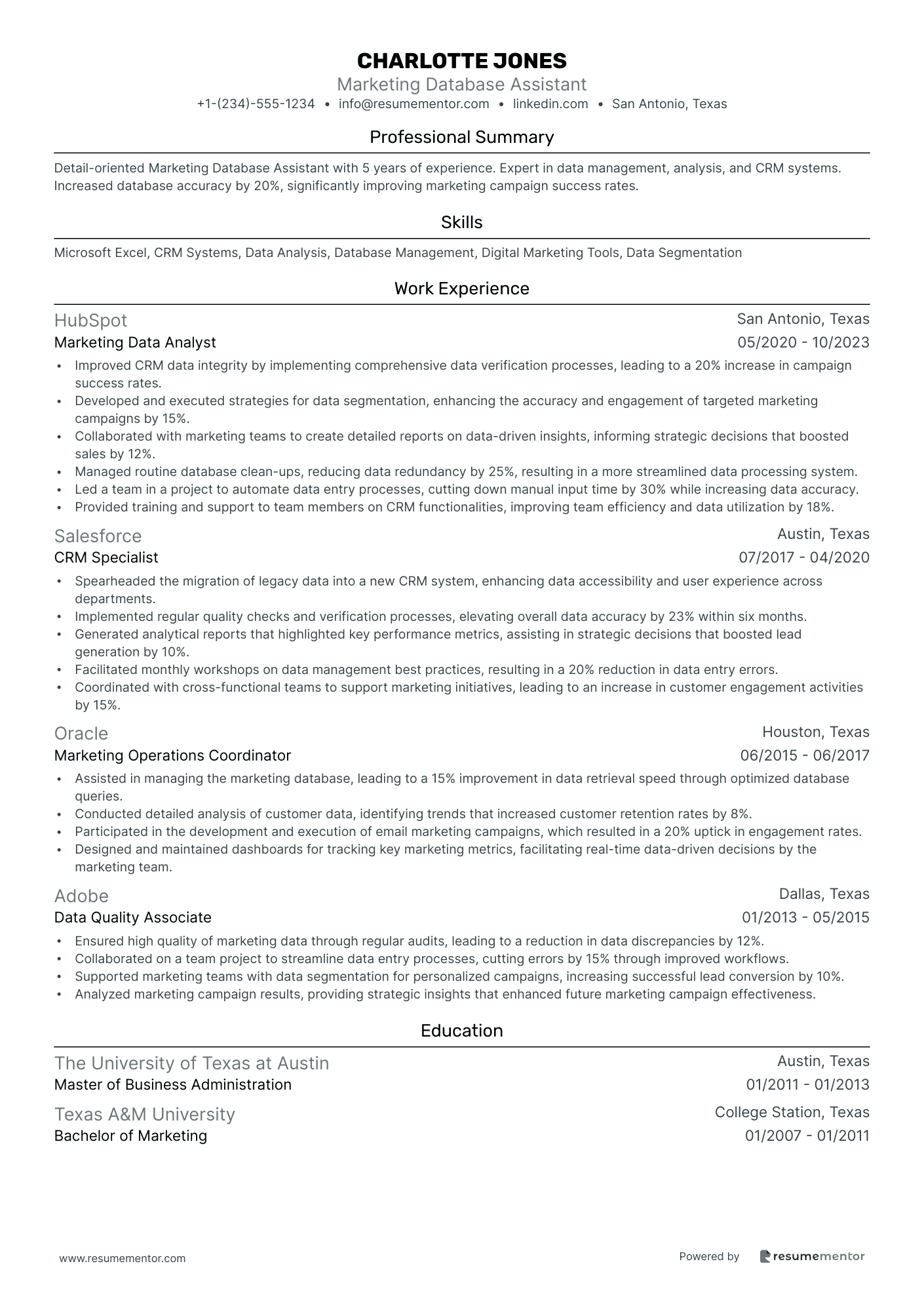
Marketing Database Assistant

Data Entry and Database Management Assistant resume sample
- •Led data entry and management projects that increased efficiency by 25% and improved data integrity significantly.
- •Developed detailed reports from complex datasets, supporting strategic decision-making for cross-department executives.
- •Implemented data cleansing initiatives, reducing data redundancy by approximately 30% within six months.
- •Collaborated with IT to modernize database systems, resulting in a 40% increase in process automation.
- •Conducted comprehensive data audits quarterly, consistently achieving higher data quality assurance metrics.
- •Trained junior staff on new database management procedures, enhancing team productivity by over 20%.
- •Coordinated a team of data specialists, leading to a 15% increase in overall data entry efficiency.
- •Streamlined data entry processes, reducing error rates by 18% through strategic procedural improvements.
- •Contributed to the development of database management software, enhancing functionality by 35% for end-users.
- •Responded promptly to data inquiries, improving department cross-functionality and efficiency.
- •Developed comprehensive user guides, reinforcing best practices for data entry and management.
- •Maintained database accuracy with over 97% consistency, significantly lowering operational downtime.
- •Implemented innovative data entry systems, leading to a 20% reduction in manual input processes.
- •Audited database systems monthly, ensuring 99% data validity and reliability across platforms.
- •Collaborated with data scientists in developing tracking systems, enhancing project management efficiency.
- •Assisted in restructuring database architecture, achieving a 25% increase in data retrieval speed.
- •Developed multiple data-entry scripts, reducing redundancy and enhancing departmental workflow.
- •Conducted training seminars, improving team cohesion and skill in data management by 15%.
- •Established quality control mechanisms, achieving a 23% reduction in data entry errors.
SQL Database Assistant resume sample
- •Managed SQL databases across multiple environments, enhancing data integrity and achieving 99.9% uptime for critical systems.
- •Optimized database queries, resulting in a 30% improvement in system performance during peak operation times.
- •Implemented comprehensive backup and recovery processes, reducing data loss incidents by 70%.
- •Collaborated with cross-functional teams to integrate data from new sources, expanding database capabilities by 15%.
- •Maintained detailed documentation of database processes, increasing operational training efficiency by 20%.
- •Conducted complex SQL queries to produce analytical reports, leading to a 25% increase in data-centric decision making.
- •Monitored and enhanced database performance, implementing solutions that reduced query execution time by 40%.
- •Supported migration to cloud-based databases, ensuring a seamless transition with zero data loss.
- •Active participant in database design projects, resulting in a 20% increase in storage efficiency.
- •Provided technical support for database issues, resolving 95% of incidents within 24 hours.
- •Created and managed large datasets, facilitating a 50% reduction in report generation time.
- •Automated routine data processing tasks, saving 15 hours of manual work per month.
- •Utilized SQL to analyze customer data trends, contributing to a 10% increase in customer retention rates.
- •Executed data integration tasks that expanded cross-departmental data accessibility by 20%.
- •Supported database users in resolving technical issues, resulting in improved user satisfaction ratings by 15%.
- •Assisted in database migrations, contributing to a smooth transition with zero downtime.
- •Documented IT and database processes, enhancing departmental training programs by 25%.
- •Contributed to a team project that streamlined data access protocols, reducing the data retrieval time by 35%.
Database Maintenance Specialist resume sample
- •Managed database maintenance, achieving a 25% decrease in downtime by optimizing performance tuning strategies.
- •Implemented database security measures that resulted in a 40% reduction in security incidents.
- •Conducted successful database migrations with zero data loss, ensuring business continuity during upgrades.
- •Led a cross-functional team to streamline database operations, resulting in a 20% cost reduction on maintenance.
- •Collaborated with IT teams to design innovative database solutions that increased data processing efficiency by 35%.
- •Created documentation for database configurations, enhancing team productivity and knowledge sharing by 50%.
- •Developed a robust backup and recovery strategy, resulting in 100% data restoration success rate.
- •Optimized query performances across multiple teams, reducing query response time by 60%.
- •Conducted index analysis and implemented strategies that improved data retrieval efficiency by 40%.
- •Played a key role in a major data archival project, significantly reducing server load by 30%.
- •Regularly updated statistics and monitored system performance, enhancing database reliability and availability.
- •Engineered complex database solutions for large-scale projects, reducing resource usage by 20%.
- •Implemented effective index rebuilding processes, leading to a 15% improvement in system performance.
- •Collaborated with development teams to integrate new database features that increased end-user satisfaction by 25%.
- •Executed detailed data analysis and reported findings to stakeholders, improving decision-making processes by 15%.
- •Successfully reduced database downtime by 40% through strategic maintenance and optimization efforts.
- •Managed data migrations, ensuring seamless transitions with no impact on business operations.
- •Conducted security audits and implemented measures that improved data protection and compliance by 30%.
- •Collaborated with client teams to tailor database solutions, enhancing data access speed by 25%.
Healthcare Database Assistant resume sample
- •Spearheaded a project to optimize database queries, reducing data retrieval time by 30% and increasing team productivity.
- •Collaborated with the IT team to develop new software solutions, resulting in a 20% increase in database efficiency.
- •Conducted monthly audits of database entries, identifying discrepancies and initiating corrective actions, which improved data accuracy by 25%.
- •Managed a team responsible for inputting and verifying healthcare data, ensuring all processes adhered to HIPAA regulations and standards.
- •Developed training programs for new staff, effectively transferring knowledge of database best practices and reducing onboarding time by 15%.
- •Generated comprehensive data reports to inform strategic clinical decisions, thereby enhancing patient care and administrative planning.
- •Improved reporting accuracy by 40% through meticulous data analysis and streamlined methodologies for error detection.
- •Worked closely with healthcare practitioners to retrieve data insights, leading to a 35% decrease in patient wait times.
- •Facilitated cross-departmental communication for data reporting, enhancing timely decision-making and reducing process bottlenecks.
- •Conducted detailed data audits quarterly and implemented corrective actions, maintaining a 98% accuracy rate across systems.
- •Produced and presented data-driven reports to upper management, aiding in data-informed policy-making and resource allocation.
- •Reviewed and coordinated clinical data collection processes, achieving a 92% data completeness rate.
- •Enhanced data validation procedures, resulting in a 25% reduction in entry errors and improved system integrity.
- •Supported clinical research by managing and extracting data, which contributed to successful study conclusions.
- •Provided technical training to staff on new database systems, significantly improving user adoption rates and efficiency.
- •Entered and maintained large volumes of healthcare data with a consistent 95% accuracy rate across all databases.
- •Assisted in the implementation of a new database system, which enhanced data retrieval processes by 20%.
- •Monitored and ensured database compliance with federal and state regulations, maintaining strict confidentiality.
- •Collaborated with IT teams to troubleshoot and rectify database issues, resulting in a 15% decrease in system downtime.
Financial Database Assistant resume sample
- •Led the upgrade of financial databases to streamline access to data, reducing retrieval time by 25% for finance team.
- •Developed and implemented processes for routine database audits, improving accuracy in financial reports by 20%.
- •Trained staff across departments in utilizing the financial database, which improved cross-functional data collaboration by 15%.
- •Resolved data discrepancies through analysis and coordination with finance team, resulting in consistent error reduction.
- •Collaborated with software developers to enhance financial software functionalities, improving user efficiency by 40%.
- •Prepared detailed financial reports, contributing to an increase in timely submission by 10% compared to previous quarters.
- •Analyzed and organized monthly financial transactions, boosting reporting accuracy by 15% annually.
- •Led a project to automate financial data entry using advanced Excel functions, cutting processing time by 35%.
- •Organized training sessions for new financial software, increasing staff efficiency in data handling by 25%.
- •Conducted quarterly audits on database systems, ensuring company policies were followed with 95% accuracy.
- •Supported creation of financial presentations for executive briefings, enhancing decision-making with accurate data visualizations.
- •Upgraded financial database systems, reducing downtime and errors, leading to a 22% increase in productivity.
- •Assisted in integration of new financial software, facilitating seamless transition with minimal disruption to operations.
- •Conducted routine database audits and collaborated on resolving discrepancies, achieving a 98% data accuracy rate.
- •Developed comprehensive user manuals for database systems, enhancing staff proficiency and usage efficiency.
- •Managed data verification processes, resulting in 30% reduction in transaction errors over one year.
- •Organized and maintained financial records efficiently, improving data retrieval speed by 18%.
- •Supported senior team in weekly financial reporting, contributing to enhanced accuracy and timeliness.
- •Assisted in setting up financial software systems, ensuring successful deployment and usage.
Customer Relationship Management Database Assistant resume sample
- •Improved data integrity by developing a comprehensive auditing process, reducing data entry errors by 20% over six months.
- •Collaborated with marketing teams to align CRM data strategies with campaigns, boosting customer engagement by 15%.
- •Led the implementation of a targeted CRM strategy that resulted in a 25% increase in customer retention within one year.
- •Created and automated monthly reports that provided actionable insights to sales teams, resulting in a 10% increase in lead conversions.
- •Trained and mentored new team members in CRM system best practices, increasing department efficiency by 18%.
- •Optimized CRM workflows, reducing data retrieval time by 35%, significantly aiding the sales team.
- •Developed and executed data quality improvement projects that enhanced database accuracy, contributing to a 30% decrease in customer service issues.
- •Conducted regular audits of CRM data leading to the resolution of over 500 data discrepancies in a year.
- •Facilitated cross-functional team meetings to streamline CRM utilization, improving data consistency across platforms by 12%.
- •Enhanced report generation processes, enabling faster and more comprehensive evaluations of customer trends and behaviors.
- •Collaborated with IT to integrate new CRM features, improving user-friendliness and system efficiency by 20%.
- •Managed extensive customer databases, implementing new data entry protocols resulting in a 40% time saving for database updates.
- •Provided analytical support for marketing campaigns, contributing to a revenue increase of 10% within six months.
- •Ensured high data quality standards through methodical checks, reducing incorrect entries by 25%.
- •Conducted in-depth data analysis that supported the successful launch of a new customer loyalty program.
- •Monitored and maintained data accuracy, improving CRM data quality, resulting in enhanced operational efficiencies.
- •Identified and rectified over 2000 erroneous records during database clean-up efforts, boosting customer trust.
- •Worked collaboratively with sales teams to ensure the CRM system provided actionable customer insights.
- •Supported system upgrades and user training initiatives, increasing system adoption rates by 15%.
NoSQL Database Assistant resume sample
- •Led a team to implement a Cassandra-based database, increasing query efficiency by 30% and reducing latency.
- •Developed and enforced data governance policies, boosting data integrity by 25% and ensuring compliance across systems.
- •Coordinated with developers to optimize 50+ database queries, reducing load times by an average of 15%.
- •Spearheaded a data migration project from SQL to NoSQL, maintaining 99.9% data accuracy post-migration.
- •Conducted regular security audits and implemented measures that improved database security protocols by 20%.
- •Mentored junior database administrators, resulting in a 50% reduction in onboarding time and improved team performance.
- •Assisted in the development of custom NoSQL solutions, reducing data processing times by 40% across major applications.
- •Monitored database performance, achieving a 20% increase in uptime and reliability by implementing advanced monitoring tools.
- •Streamlined backup and recovery processes, leading to a 30% reduction in data recovery times during critical outages.
- •Collaborated with cross-functional teams to design schema structures that improved data retrieval speeds by 25%.
- •Trained staff on new database features and best practices, enhancing team efficiency and reducing error rates by 15%.
- •Engineered database schema that optimized data storage efficiency, leading to a 20% reduction in storage costs.
- •Implemented and configured Couchbase databases, maintaining 95% operational efficiency across multiple environments.
- •Improved database security measures, resulting in a 15% decrease in vulnerability incidents over two years.
- •Automated routine database tasks, saving 10 hours per week in manual maintenance and boosting productivity.
- •Analyzed and optimized database queries, improving transaction speeds by 25% across high-demand applications.
- •Supported data migration projects, ensuring smooth transitions and 98% data retention accuracy.
- •Created comprehensive database documentation, enhancing user understanding and reducing support queries by 20%.
- •Contributed to database performance tuning, achieving a 15% reduction in query execution times.
Relational Database Assistant resume sample
- •Redesigned a complex database architecture that improved system efficiency by 30% and reduced data retrieval times by 20%.
- •Implemented regular data audits, leading to a 25% improvement in data accuracy and integrity across departments.
- •Led a team of three in completing a database migration project ahead of schedule, reducing transition time by 40%.
- •Created detailed database documentation, simplifying user onboarding processes and reducing technical support inquiries by 15%.
- •Monitored and optimized database performance metrics, resulting in a 40% reduction in system downtime.
- •Collaborated closely with software development teams, enhancing cross-functional communication and delivering projects 10% faster.
- •Streamlined a batch processing system leading to a 35% increase in data processing speed, improving operational efficiency.
- •Conducted in-depth performance tuning and optimization, resolving server issues and decreasing load times by 25%.
- •Facilitated database integration for new software applications, enhancing data handling capabilities company-wide.
- •Provided high-level technical support to multiple departments, maintaining a 95% satisfaction rating in service delivery.
- •Spearheaded training sessions on database software tools, which led to a 50% reduction in onboarding time.
- •Conducted comprehensive data audits resulting in the recovery of valuable datasets previously inaccessible.
- •Implemented a backup system that slashed data recovery times by 60%, safeguarding critical information during incidents.
- •Developed a reporting module, which increased data visualization capabilities by 40% across business departments.
- •Collaborated on a project to upgrade database security protocols, enhancing overall system protection by 20%.
- •Managed data entry projects improving record accuracy by 25%, ensuring seamless access across organizational platforms.
- •Took part in the digital transformation initiative, contributing to the successful rollout of a new data management software.
- •Coordinated routine database backups, maintaining a zero data loss record during tenure.
- •Maintained user access controls, implementing policy changes that reduced unauthorized access incidents by 30%.
Database Security Assistant resume sample
- •Implemented security policies that reduced potential database breaches by 30%, enhancing overall data protection system-wide.
- •Monitored and analyzed over 1 million database activities monthly to detect anomalies, increasing breach detection speed by 25%.
- •Conducted quarterly security audits, discovering 15 vulnerabilities and collaborated with IT teams to rectify them.
- •Developed incident response plans leading to a 40% decrease in incident resolution time.
- •Trained over 100 employees on database security protocols resulting in increased compliance with data protection standards.
- •Collaborated on security systems testing, achieving 20% more robust security measures across multiple database platforms.
- •Managed user access for over 500 database users, ensuring correct permissions, resulting in a 15% improvement in access security.
- •Conducted monthly vulnerability assessments and audits on databases, uncovering 30 security risks.
- •Collaborated with cross-functional teams to integrate security measures, reducing unauthorized access attempts by 20%.
- •Documented security incidents, contributing to an enhanced incident response system with 30% faster turnaround.
- •Contributed to compliance initiatives, aligning database systems with HIPAA and GDPR regulations.
- •Assessed database systems, identifying potential security vulnerabilities, resulting in a 15% decrease in critical threats.
- •Developed tools for continuous monitoring of database activities, enhancing real-time security alerts and responses.
- •Collaborated with database teams, integrating security best practices that improved data protection by 20%.
- •Participated in crafting and testing new security tools, increasing detection accuracy of unauthorized access attempts.
- •Managed infrastructure and databases, ensuring optimal performance and adherence to security standards.
- •Implemented basic security practices, reducing common security threats to critical databases by 10%.
- •Provided support during scheduled security checks, helping initiate corrective measures swiftly and effectively.
- •Assisted in maintaining compliance with security frameworks, aligning IT practices with industry standards.
Marketing Database Assistant resume sample
- •Improved CRM data integrity by implementing comprehensive data verification processes, leading to a 20% increase in campaign success rates.
- •Developed and executed strategies for data segmentation, enhancing the accuracy and engagement of targeted marketing campaigns by 15%.
- •Collaborated with marketing teams to create detailed reports on data-driven insights, informing strategic decisions that boosted sales by 12%.
- •Managed routine database clean-ups, reducing data redundancy by 25%, resulting in a more streamlined data processing system.
- •Led a team in a project to automate data entry processes, cutting down manual input time by 30% while increasing data accuracy.
- •Provided training and support to team members on CRM functionalities, improving team efficiency and data utilization by 18%.
- •Spearheaded the migration of legacy data into a new CRM system, enhancing data accessibility and user experience across departments.
- •Implemented regular quality checks and verification processes, elevating overall data accuracy by 23% within six months.
- •Generated analytical reports that highlighted key performance metrics, assisting in strategic decisions that boosted lead generation by 10%.
- •Facilitated monthly workshops on data management best practices, resulting in a 20% reduction in data entry errors.
- •Coordinated with cross-functional teams to support marketing initiatives, leading to an increase in customer engagement activities by 15%.
- •Assisted in managing the marketing database, leading to a 15% improvement in data retrieval speed through optimized database queries.
- •Conducted detailed analysis of customer data, identifying trends that increased customer retention rates by 8%.
- •Participated in the development and execution of email marketing campaigns, which resulted in a 20% uptick in engagement rates.
- •Designed and maintained dashboards for tracking key marketing metrics, facilitating real-time data-driven decisions by the marketing team.
- •Ensured high quality of marketing data through regular audits, leading to a reduction in data discrepancies by 12%.
- •Collaborated on a team project to streamline data entry processes, cutting errors by 15% through improved workflows.
- •Supported marketing teams with data segmentation for personalized campaigns, increasing successful lead conversion by 10%.
- •Analyzed marketing campaign results, providing strategic insights that enhanced future marketing campaign effectiveness.
Crafting a strong resume as a database assistant can feel like piecing together a complex puzzle, where every piece counts. Your technical expertise is the backbone that keeps data flowing smoothly, making it crucial to highlight your skills effectively. However, the challenge often lies in weaving these technical abilities with softer skills, like communication and problem-solving, into a cohesive narrative. Striking that balance is essential to stand out in the crowded job market.
To capture a hiring manager’s attention, you need more than just a list of skills; you need an engaging and organized presentation. This is where the right resume templates come into play, acting as a guide to seamlessly arrange your experiences and competencies. A well-chosen template not only gives your resume a professional look but also helps to tailor it to the specific role you’re targeting.
Think of your resume as more than just a list of jobs. It’s your personal marketing tool—a window into your career journey and the unique skills you offer. By using a template, you can effectively weave together your data management strengths and your career narrative. Done right, your resume becomes the key that opens doors to exciting new job opportunities.
Key Takeaways
- Crafting a compelling database assistant resume involves highlighting both technical skills and softer skills like communication and problem-solving to stand out in the job market.
- Choosing an organized and aesthetically pleasing resume format, such as a chronological one, helps present work history clearly, while templates can guide the effective arrangement of experiences and skills.
- In the work experience section, detail past roles with job titles, and emphasize achievements using action words and quantifiable results to demonstrate impact.
- A skills section should highlight key abilities like database management, SQL proficiency, and more, using structured lists that can double as keywords for recruiters.
- Including education and certifications enhances credibility, while additional sections on language skills, volunteer work, and personal interests can differentiate candidates further by showcasing versatility and commitment to continuous learning.
What to focus on when writing your database assistant resume
A database assistant resume should clearly highlight your data management skills and technical expertise. It needs to show your ability to efficiently organize and maintain data systems, ensuring both accuracy and security. Demonstrating your competence with database software and tools is essential—this allows potential employers to see how you fit into their teams.
How to structure your database assistant resume
- Contact Information: Begin with your full name, phone number, and professional email address to make it easy for recruiters to reach you. Use a clean, simple format to keep this section professional and concise—this ensures your details are easily accessible and you're making a strong first impression.
- Professional Summary: Craft a brief statement that highlights your strengths in database management, including experience with tools like SQL or Oracle. This summary acts as your elevator pitch—it sets the stage for your qualifications and should grab the recruiter's attention quickly.
- Skills: In this section, include specific abilities such as data entry proficiency, SQL querying, database maintenance, and an understanding of data security protocols. These skills paint a clear picture of what you can bring to the table—emphasizing them helps potential employers see the immediate value you can add.
- Work Experience: This section allows you to detail past roles with job titles, company names, and dates. Use bullet points to emphasize accomplishments like improved data retrieval times and streamlined processes—such achievements demonstrate the direct impact you've had in previous positions.
- Education: Share your academic background, focusing on degrees and relevant courses in information systems or data management, along with the institution and graduation date. This highlights your foundational knowledge, which supports your ability to fulfill the role's requirements.
- Technical Certifications: Mention certifications like Microsoft Certified: Azure Database Administrator or Oracle Certified Associate if you have them. This shows your commitment to staying updated in the field and can set you apart from other candidates—reinforcing your dedication and expertise.
For additional impact, consider adding sections like "Volunteer Experience" or "Projects" that relate to database management, further illustrating your skills and dedication. Below, we'll cover each section more in-depth, starting with resume format to ensure each part of your resume is optimized for success.
Which resume format to choose
Creating a database assistant resume involves several key elements that work together to highlight your skills and experience effectively. Choosing the right format is crucial, and a chronological format is often the best choice. This format showcases your work history in a clear, linear way, making it easy for employers to see your growth and experience in data management or administrative support roles. This clarity is invaluable, as it quickly communicates your professional journey.
The aesthetic of your resume matters too, which is where font selection comes in. Opting for modern fonts like Raleway, Lato, or Montserrat can give your resume a fresh and professional look. These fonts are not only easy on the eyes but also convey a sense of modernity and approachability that can resonate well with employers in any industry.
Ensuring your resume's format remains intact is equally important, which is why saving your document as a PDF is recommended. PDFs preserve your formatting, ensuring that your resume looks professional and polished no matter where or how it’s viewed. This consistency can help maintain the professionalism you're aiming to project.
Lastly, proper use of space through margins is essential. Keeping margins at around 1 inch on all sides provides a clean frame for your content. It prevents your resume from feeling cluttered, allowing your skills and experience to stand out. This thoughtful layout ensures that potential employers can easily focus on your qualifications.
Together, these elements form a cohesive strategy for crafting an effective database assistant resume, enabling you to present your expertise and readiness for new opportunities with clarity and professionalism.
How to write a quantifiable resume experience section
A strong experience section on a database assistant resume ties your achievements and skills in managing databases into a compelling narrative. Begin with your most recent experience to immediately show current skills and accomplishments. Focus on the last 10-15 years, prioritizing roles related to database management, so employers see how your experience directly applies. Use clear job titles like "Database Assistant" to define your responsibilities. To make your skills more appealing, connect each job entry with the specific needs of the job you're applying for. Use action words such as "optimized," "analyzed," or "maintained" to articulate your contributions and highlight quantifiable achievements. Numbers make your successes tangible, showing how you increased data processing efficiency or improved accuracy.
- •Optimized database operations, improving data retrieval speed by 40%
- •Analyzed and corrected data discrepancies, enhancing data integrity by 25%
- •Maintained data entry accuracy at 99.5% through systematic checks
- •Collaborated with IT teams to implement new database features, reducing processing time by 35%
This experience section effectively draws connections between the impact of your past work and the skills sought by employers. The quantifiable results you provide tell a story of success, demonstrating real improvements like boosting efficiency and enhancing accuracy. By tailoring your entries for the role of a database assistant, you make it easy for employers to envision your contributions to their team. This approach not only highlights your previous achievements but also paints a picture of your potential value to a new organization.
Achievement-Focused resume experience section
An achievement-focused database assistant resume experience section should highlight how your efforts made a difference. Begin by showcasing what you accomplished in previous roles that make you a standout candidate for the job. Emphasize the ways you improved processes, increased efficiency, and solved complex problems. Using action words can draw attention to your accomplishments, and including numbers, like data managed or error reductions, makes your success more concrete and believable.
Linking each bullet point to a larger impact is crucial. Instead of just listing tasks, describe how your contributions directly benefited your team or organization. Keep the language straightforward and engaging to ensure easy readability. By creating this connected narrative, you effectively demonstrate your skills and readiness for the role you're targeting.
Database Assistant
Tech Solutions Inc.
June 2020 - Present
- Streamlined database systems, cutting data retrieval time by 30%, which provided over 100 users with quicker access and improved workflow.
- Introduced data validation measures that boosted accuracy by 20%, thereby significantly reducing errors and enhancing overall data quality.
- Developed automated scripts that accelerated reporting, saving the team more than 10 work hours each week and allowing for a focus on more critical tasks.
- Collaborated closely with team members to smoothly transition legacy data, ensuring a seamless integration into a new database system.
Growth-Focused resume experience section
A growth-focused database assistant resume experience section should clearly demonstrate your role in advancing business success. Highlight achievements that showcase your ability to increase sales, improve customer loyalty, or widen market reach, using measurable results to illustrate your impact. Every bullet point should connect back to a specific outcome to demonstrate how your efforts contributed to growth. Tailor these experiences to align with the goals of the job you're applying for, ensuring your contributions are relevant and compelling.
Begin by stating your role and the company's name, then list accomplishments that highlight your impact on growth. Use strong action verbs and focus on key actions that led to substantial outcomes. This not only shows your expertise but also reflects your strategic approach to driving growth through your initiatives.
Database Assistant
Tech Solutions Inc.
June 2020 - Present
- Enhanced data retrieval efficiency by 30%, resulting in a 20% quicker project completion.
- Led a team in integrating new data processes, improving accuracy by 15%.
- Developed reporting tools that cut decision-making time for managers by 40%.
- Streamlined client data management, boosting customer satisfaction ratings by 25%.
Skills-Focused resume experience section
A skills-focused database assistant resume experience section should effectively highlight your technical and analytical competencies specifically relevant to the role. Start by showcasing the contributions you've made in designing, managing, and optimizing databases, ensuring that your work has enhanced data accuracy and streamlined workflows. Illustrate how you've supported data queries and reporting efforts, demonstrating the direct impact of your responsibilities on improving processes. Mention the tools or software you've used and provide concrete examples of the improvements or results achieved through your actions.
To ensure your resume stands out, focus on achievements rather than just duties. Use concise bullet points to detail your unique skills and accomplishments, which highlight your potential to excel as a database assistant. Start each point with an active verb and incorporate specific metrics to showcase the impact of your work, allowing potential employers to see the value you can bring to their team.
Database Assistant
XYZ Technologies
June 2021 - Present
- Led initiatives to enhance database performance with regular updates and query tuning, achieving a 20% reduction in data retrieval time.
- Collaborated with IT and management to improve report accuracy by 15%, supporting internal teams in data retrieval and reporting tasks.
- Developed and maintained user-friendly documentation for database procedures, boosting operational efficiency and user understanding by 30%.
- Utilized SQL and automation tools to design queries and scripts, saving the team an average of 10 hours per week by streamlining data extraction tasks.
Responsibility-Focused resume experience section
A responsibility-focused database assistant resume experience section should clearly show how you manage and optimize databases efficiently. Begin by outlining your key responsibilities, such as database maintenance and ensuring data accuracy, to set the context for your role. Emphasizing your knowledge of database management systems and your ability to use them effectively is essential. Active language and real examples can illustrate your proficiency in handling complex tasks seamlessly.
Next, use bullet points to organize your main achievements, ensuring clarity and impact. Highlight specific accomplishments like implementing a database system that reduced data loss or optimizing queries for faster retrieval. These points should not only demonstrate your technical skills but also your problem-solving capabilities and attention to detail, showcasing a well-rounded professional. Keeping the language simple and directly relevant to the job you're targeting ensures there's a clear connection between your past experiences and the role you're aiming to secure.
Database Assistant
Tech Innovators Corp.
June 2020 - Present
- Implemented a new data backup system, reducing potential data loss by 75%.
- Optimized database queries, enhancing data retrieval efficiency by 30%.
- Assisted in maintaining data integrity across multiple platforms, ensuring 99% accuracy.
- Managed a team of junior database assistants, fostering a collaborative work environment.
Write your database assistant resume summary section
A skills-focused database assistant resume summary should effectively showcase your key attributes and experiences that set you apart. Think of this summary as your personal elevator pitch, providing a quick and engaging insight into your capabilities. Highlighting your meticulous attention to detail, efficient data management talents, and familiarity with various database systems can really capture an employer's attention. By also emphasizing your problem-solving abilities and collaborative spirit, you demonstrate that you bring more to the table than just technical skills.
Consider this summarized example:
This summary does an outstanding job because it ties together specific achievements like improving data retrieval efficiency, highlighting the direct impact you've had in previous roles. It smoothly mentions relevant technical skills and accurately reflects your experience level without getting too detailed or technical.
Choosing the right section to express your qualifications can be crucial. A resume summary offers a quick snapshot of your skills and accomplishments, ideal for those with experience. In contrast, a resume objective is more suited for those at the start of their career, focusing on your goals. A resume profile merges your background with your skills into a concise overview. Finally, a summary of qualifications lists key achievements in bullet points. Understanding these distinctions helps you select the best approach, depending on your career stage and the role you’re interested in.
Listing your database assistant skills on your resume
A skills-focused database assistant resume should clearly highlight the talents that make you stand out in the field. You can showcase your skills as a standalone section or integrate them into areas like your experience or summary. Your strengths and soft skills, such as communication and adaptability, reveal how you interact with others and navigate changes smoothly. Meanwhile, hard skills are specific abilities or technical knowledge areas, such as SQL or database management, that you bring to the table.
Incorporating skills and strengths effectively can transform them into keywords that capture the attention of recruiters and automated systems. These keywords boost your visibility and increase your chances of being noticed. Here's an example of how to structure a standalone skills section:
This structured skills section effectively targets the abilities needed for a database assistant. It prioritizes key skills that are crucial and in-demand for the role, ensuring your resume resonates with potential employers.
Best hard skills to feature on your database assistant resume
Hard skills specific to a database assistant role should showcase your technical expertise and efficiency. These skills confirm your capability to manage database tasks and solve technical problems. Important hard skills include:
Hard Skills
- SQL proficiency
- Database management
- Microsoft Access
- Oracle databases
- Microsoft Excel
- Data entry accuracy
- Reporting tools expertise
- Data analysis
- Data cleaning
- MySQL
- Query optimization
- VBA (Visual Basic for Applications)
- Database security awareness
- ERD (Entity-Relationship Diagram) creation
- Backup and recovery procedures
Best soft skills to feature on your database assistant resume
The soft skills you list reflect your personal traits, highlighting your ability to thrive as a team member. These skills demonstrate how well you work with others and adapt to various work environments. Essential soft skills for a database assistant include:
Soft Skills
- Attention to detail
- Effective communication
- Problem-solving
- Time management
- Teamwork
- Reliability
- Adaptability
- Critical thinking
- Multitasking ability
- Positive attitude
- Initiative
- Listening skills
- Organizational skills
- Stress management
- Flexibility
How to include your education on your resume
The education section is an essential part of your database assistant resume. It showcases your academic background, giving potential employers a sense of your qualifications. Tailor this section to suit the job you're applying for by omitting irrelevant education. If you include your GPA, ensure it strengthens your application. Mention any honors like cum laude to highlight your academic achievements. To list a degree, include the degree type, major, institution, and graduation date.
Wrong example:
Right example:
The right example is strong because it features a degree relevant to being a database assistant, showcasing skills that match the job. The GPA is high and indicates academic excellence, further supported by "cum laude" honors, which make your resume stand out. By listing the Computer Science degree, employers see a direct connection to database skills and knowledge. This education section clearly aligns with the job, making it effective for a database assistant application.
How to include database assistant certificates on your resume
Including a certificates section in your database assistant resume is crucial. A well-organized certificates section can set you apart from other candidates. This section shows your commitment to developing your skills. It can also highlight your specialized knowledge relevant to the job.
To set up this section, list the name of the certificate. Include the date you received it. Add the issuing organization as well. Placing certificates in the header is also an option. For example, you could write "Certified Database Professional (2019, ABC Institute)".
A good standalone certificates section could look like this:
This example clearly details relevant certifications. The titles are specific and recognized in the database field. Including the issuers shows the credibility of your certificates. These details make it easy for employers to assess your expertise quickly.
Extra sections to include in your database assistant resume
A well-crafted database assistant resume showcases your technical proficiency, attention to detail, and organizational skills. To stand out, it's important to include sections that highlight your multifaceted abilities and interests. Here are some tips on how to effectively enhance your resume.
Language section — List languages you are fluent in like SQL, Python, and any other relevant language. Demonstrating language skills boosts your employability, especially in a global company setting.
Hobbies and interests section — Include hobbies like data visualization, coding challenges, and blogging about technology trends. Highlighting personal interests that align with your career can make you more relatable and well-rounded.
Volunteer work section — Mention volunteer activities like helping a local non-profit manage their database or teaching coding classes. Volunteering shows you have a community-oriented mindset and strengthens your resume by demonstrating real-world application of your skills.
Books section — List influential books you've read such as "SQL for Data Analytics" or "Python Data Science Handbook." Sharing your reading list shows you are committed to continuous learning and staying updated in your field.
In Conclusion
In conclusion, crafting a successful database assistant resume involves a strategic blend of technical and soft skills, presented in a clear and professional manner. Your resume serves as a marketing tool that showcases your ability to manage data systems efficiently while highlighting your adaptability and communication prowess. Choosing the right format, such as chronological order, helps illustrate your career progression and achievements effectively. Each section of your resume, from skills to education, should be tailored to demonstrate your qualifications for the role you're targeting. Utilizing action verbs and quantifiable results underscores your contributions and the tangible benefits you bring to an organization. Including certifications further emphasizes your dedication to professional growth and expertise in the field. Additional sections like volunteer work or language skills can provide a more comprehensive view of your capabilities and interests. By keeping your resume concise yet informative, you increase the likelihood of capturing a hiring manager's attention in the highly competitive job market. Ultimately, a well-crafted resume positions you as a compelling candidate, ready to contribute to organizational success through your data management expertise.
Related Articles

Continue Reading
Check more recommended readings to get the job of your dreams.
Resume
Resources
Tools
© 2026. All rights reserved.
Made with love by people who care.

